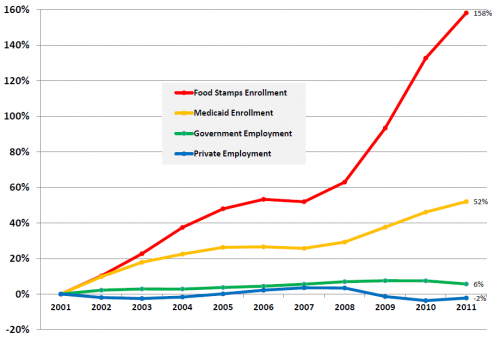Kevin Drum is uncomfortable that Google got off the hook on anti-trust charges merely because it was not harming consumers
Google made a number of arguments in its own defense, and consumer welfare was only one of them. Still, it was almost certainly the main reason they won, and it's still not clear to me that this is really what's best for consumers in the long run. Did Google users click on the products they highlighted? Sure. Did they buy some of the stuff? Sure. Were they happy with their purchases? Sure. Is that, ipso facto, evidence that there's no long-run harm from a single company dominating the entire search space? I doubt it. After all, John D. Rockefeller could have argued that consumers bought his oil and were pretty happy with it, so what was the harm in his controlling the entire market?
The tech industry moves fast enough that antitrust might genuinely not be a big issue there. In the end, it wasn't antitrust that hurt IBM and Microsoft. It was the fact that the industry moved rapidly toward smaller computers and then the internet, and neither company was really able to react fast enough to dominate these new spaces. Nonetheless, I'm skeptical of the tautology at the heart of the consumer welfare argument. If a company is successful, then by definition people must be buying its stuff. On this basis, bigness is simply unassailable anymore. That has broad societal implications that I suspect we're not taking seriously enough.
He seems to be arguing that we consider returning to a pure bigness standard without reference to consumer harm. I am not sure that we ever followed such a standard, but certainly today the alternative to a consumer harm standard is not a bigness standard but a competitor harm standard. Whether he knows it or now, this is essentially what Drum is advocating. We see this in the article he quotes:
But while the F.T.C. said that Google’s actions might have hurt individual competitors, over all it found that the search engine helped consumers, as evidenced by Google users’ clicking on the products that Google highlighted and competing search engines’ adopting similar approaches.
I am not sure what Drum really wants, but the result of eliminating the consumer-harm standard would be an environment where every failed company can haul its more successful competitors in front of the government and then duke it out based on relative political pull rather than product quality. It is pretty well understood out there that this anti-Google FTC claim was initiated and championed by Microsoft, certainly not among the powerless typically championed by progressives, and a company well known to have missed the boat on Internet search and which is apparently trying to do now through government fiat what it has not been able to do in the marketplace. Microsoft learned this technique from Sun and Oracle, which took Microsoft to the FTC in the famous browser case where Microsoft faced years of anti-trust scrutiny for the crime of giving the public a free product.
Already, anti-trust law is an important tool of the corporate state, to allow politically powerful companies to squash competition from those who invested less money in their Washington office. I am not a legal expert at all, but this consumer standard in anti-trust strikes me as a critical shield stopping a hell of a lot more abuse of anti-trust law.
By the way, there is a modern bigness problem with corporations that is very troubling -- we have made government tremendously powerful, giving it many tools to arbitrarily choose winners and losers without any reference to justice or rights. As private entities get larger and richer, they are better able to access and wield this power in their own favor. The libertarian solution is to reduce the government's power to pick winners and losers. The progressive answer is to regulate business more with tools like anti-trust.
But the progressive solution has a built-in contradiction, which why Drum probably does not suggest a solution. Because the very tools progressives suggest to regulate business typically become the tools with which politically connected corporations further tilt the game in their own favor. Anti-trust is a great example. We want to reduce the number of large companies with an eye to reducing corporatism and cronyism, but the very tool to do so -- anti-trust law -- has become one the corporate crony's best tools for stepping on competitors and insulating their own market positions.
And by the way, Rockefeller's Standard Oil did a HELL of a job for consumers. It was nominally punished for what it might some day hypothetically do to consumers.
Here are the facts, via Reason
Standard Oil began in 1870, when kerosene cost 30 cents a gallon. By 1897, Rockefeller's scientists and managers had driven the price to under 6 cents per gallon, and many of his less-efficient competitors were out of business--including companies whose inferior grades of kerosene were prone to explosion and whose dangerous wares had depressed the demand for the product. Standard Oil did the same for petroleum: In a single decade, from 1880 to 1890, Rockefeller's consolidations helped drive petroleum prices down 61 percent while increasing output 393 percent.
By the way, Greenpeace should have a picture of John D. Rockefeller on the wall of every office. Rockefeller, by driving down the cost of kerosene as an illuminant, did more than any other person in the history to save the whales. By making kerosene cheap, people were willing to give up whale oil, dealing a mortal blow to the whaling industry (perhaps just in time for the Sperm Whale).
So Rockefeller grew because he had the lowest cost position in the industry, and was able to offer the lowest prices, and the country was hurt, how? Sure, he drove competitors out of business at times through harsh tactics, but most of these folks were big boys who knew the rules and engaged in most of the same practices. In fact, Rockefeller seldom ran competitors entirely out of business but rather put pressure on them until they sold out, usually on very fair terms.
From "Money, Greed, and Risk," author Charles Morris
An extraordinary combination of piratical entrepreneur and steady-handed corporate administrator, he achieved dominance primarily by being more farsighted, more technologically advanced, more ruthlessly focused on costs and efficiency than anyone else. When Rockefeller was consolidating the refining industry in the 1870s, for example, he simply invited competitors to his office and showed them his books. One refiner - who quickly sold out on favorable terms - was 'astounded' that Rockefeller could profitably sell kerosene at a price far below his own cost of production.



